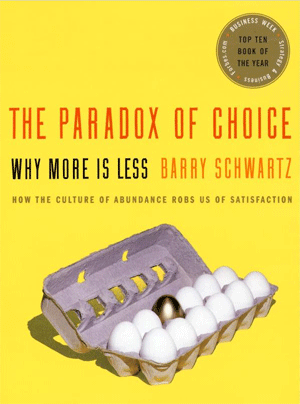Do you feel sometimes overwhelmed by all the objectives, the data, the platforms, the options and even the mere possibilities in your daily work?
I have to admit: I do.
And, chances are you do too according to “The enemy of clarity,” a post Andrew Careaga wrote earlier this week.

We live in a world of possibilities – and while it’s fantastic, it is definitely more challenging to make decisions, the right decisions. That’s the reason I was really excited when I heard about the Heath brothers new book: Decisive: How to Make Better Choices in Life and Work
. And, while I was searching to order it it on Amazon, I got sidetracked after looking at the related books listed on the page and seeing the bright yellow cover (my brain is a sucker for anything in the neighborhood of orange) of the “The Paradox of Choice”
by Barry Schwartz.
Then, when I read the subtitle: “Why More is Less – How the culture of abundance robs us of satisfaction,” I was totally sold. I had to read this book that promised to answer the big question that had bothered me for a few months. Published in 2004, the book was apparently a classic I’ve had managed to miss – until last month – in my reading quest.
So, here’s my 1-1-1 Express Book Review of The Paradox of Choice: Why More Is Less by Barry Schwartz, Professor at Swarthmore College.
1 thing I liked
While this book resonated 10 years ago when it was first published, it definitely hits even more the target in our social media world where everybody has become a publisher. Without the financial barrier of entry, tons of content is written, published and shared every day. Breaking through the noise is the real challenge today for college marketers and universities communicators. And, it has become tougher and tougher. By analyzing the plethora of choices available today, this book offers some solace to the burnt-out-by-too-many-choices brains.
In the book, Prof Schwartz makes a few higher ed references and illustrates the burden of choice by discussing the challenges faced by students and their families when it comes to choosing the best (and often not the right) college or academic path. As he explained, it’s no wonder they are paralyzed in a world where social comparison is at its highest with the always-on life broadcasting empowered by facebook, twitter and the likes. But, beyond the diagnostic of the issue, this book also offers a roadmap to help us survive and thrive in this world of choices.
1 thing I didn’t like too much
I love this book, because reading it really felt like chicken soup for the overburden-by-choices soul. But, as you know, if you read a few of my book reviews, I’m always going for a balanced view. So, I would say that the first part of the book, “When we choose,” detailing all the different parts of our lives where we are presented with a choice was a bit too long to my taste. The context has changed a lot in the past decade and I believe that the explosion of choices has intensified exponentially. As a result, it is probably an easier case to make than it was a decade ago.
1 big take-away from the book
At the end of the book, in Part 4, Barry Schwartz offers 11 action-oriented strategies to cope with the burden of choice. I’m not going to share all of them, but the 3 ones I found the most useful:
- Choose when to choose:
It’s not because we can spend our day choosing among many options every single detail of our life that we should. You need to find out when a choice really matters to you. A simple illustration of this principle is Steve Job’s or Mark Zuckenberger’s wardrobe choices. Both have spent a great deal of time making important choices in their successful careers, but the way they dressed wasn’t important for what they set to achieve. So, they choose an outfit that worked for them once and sticked with it. - Satisfice more, maximize less:
Both terms are explained in the book, but what it comes down to is to aim for good enough in as many areas of your life as possible when the ultimate best is not a requirement. This one is a struggle for “recovering perfectionist” me. But, you got to face it: not every task accomplished needs to be a work-of-art. The facebook motto I’ve heard about while reading “Lean In” written by its COO, Sheryl Sandberg, has become a new favorite of mine: “done is better than perfect.” - Learn to love constraints:
As a painter focusing his attention and creativity on a given canvas, you have to limit the options to a more friendly number to accomplish anything. Prof Schwartz advises to create your own set of rules and standards for helping in the case of mundane decisions. This will allow you to let your autopilot deal with these small choices and your brain focus on what really matters.
Check out the TED Talk!
It’s 20-minute long and really focuses on the 1st part of the book, but it will give you an idea about what the paradox of choice is.



